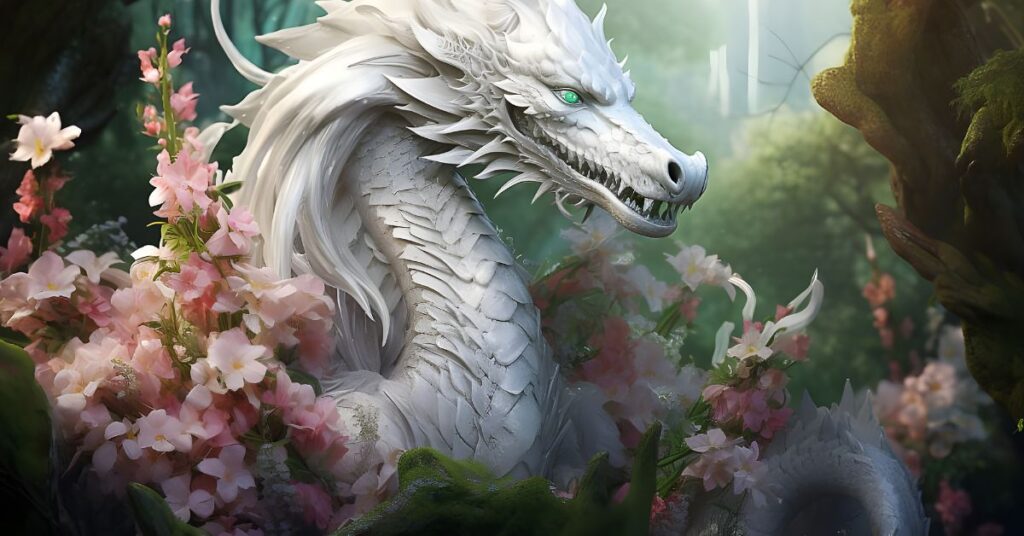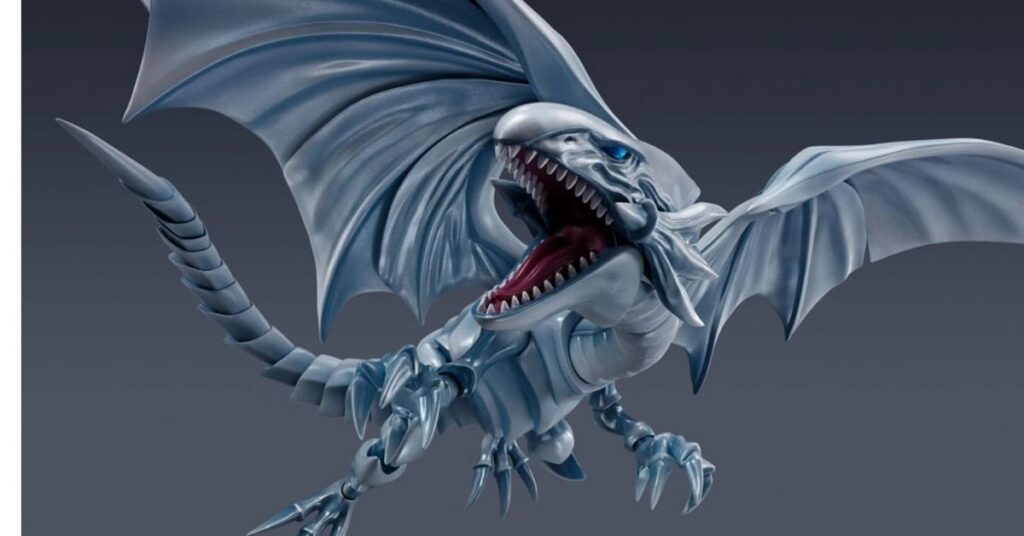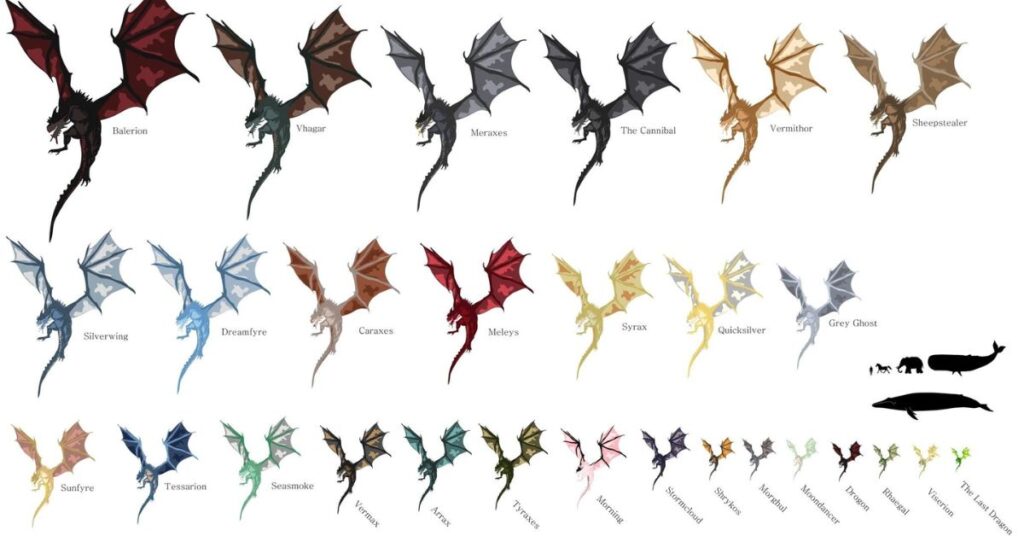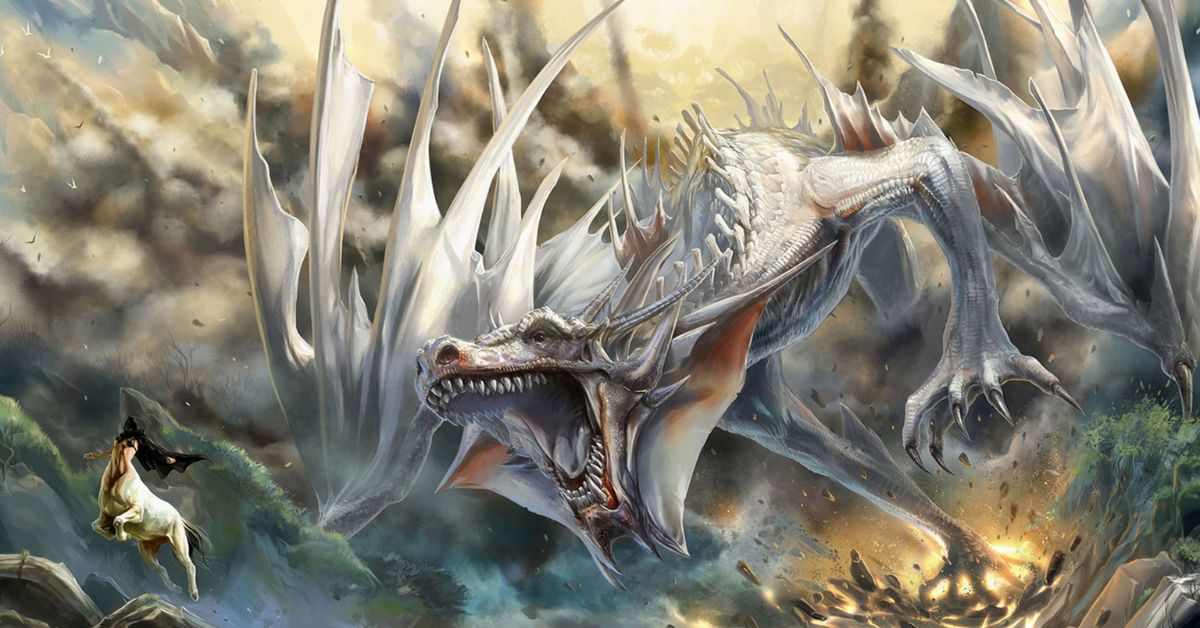White dragons are fascinating creatures in mythology and fantasy. Known for their icy breath and ruthless nature, these dragons thrive in snowy, cold climates. Their scales are bright white, often blending seamlessly into their frozen surroundings.
In fantasy stories, white dragons are usually portrayed as fierce and highly territorial. They’re often found in snowy mountains or arctic regions, guarding their lairs with intensity. Their cold nature reflects their icy habitats and relentless survival instincts.
Choosing a name for a white dragon should capture its frost-bound strength and mysterious charm. A good name can reflect its icy power, intimidating presence, or even a hint of ancient wisdom. The right name adds depth to any story or character, making it feel real and unforgettable.
Interesting Facts About White Dragons
There are some interesting facts about white dragons:
Cold Adaptation: White dragons are often depicted as having unique physiological adaptations, like frost-resistant scales, allowing them to survive in extreme cold environments.
Predatory Nature: These dragons are known for their keen hunting skills, often using the element of surprise to catch prey in snowy landscapes where they can blend in.
Icy Breath: Many myths give white dragons the ability to breathe freezing air or frost, which they use to immobilize enemies and protect their territories.
Territorial Behavior: White dragons are highly territorial, usually staking out vast, secluded areas in arctic or alpine regions as their domain.
Enhanced Vision: Their keen eyesight is adapted to low-light conditions, helping them navigate snowy storms and see through blizzards to spot potential threats or prey.
Tips for Choosing White Dragon Names
When choosing a name for a white dragon, it’s important to capture its icy, fierce nature and mystical charm. Here are some quick tips to help find the perfect name:
- Reflect the Ice Element: Choose names that evoke cold, frost, or snow to match the dragon’s icy environment, like “Frostbane” or “Glacierwing.”
- Consider Ancient Languages: Use words from ancient or mythical languages to add an exotic feel, such as “Aisur” (from “ice”) or “Nivara” (snow-inspired).
- Emphasize Power and Strength: White dragons are known for their ferocity; pick names that convey power, like “Stormclaw” or “Icelash.”
- Use Descriptive Imagery: Think of names that evoke visuals of snow and glaciers, like “Blizzardshade” or “Snowcrest.”
- Add a Touch of Mystery: White dragons are often reclusive; names with a mysterious edge, such as “Veilthrax” or “Eirglow,” can add depth to their character.
Elegant White Dragon Names

Elegant white dragon names capture the beauty and mystique of these majestic creatures. Names like “Eirlys” or “Avalure” offer a refined touch, ideal for a fantasy white dragon. Such names evoke grace, power, and the serene nature of ice.
- Alabaster: Named after the white mineral, symbolizing purity and resilience; often linked to strength and unyielding spirit.
- Alaric: Meaning “ruler of all” with origins in ancient Germanic languages; embodies authority and wisdom.
- Arcticus: Inspired by the Arctic, this name reflects icy strength and endurance against harsh conditions.
- Aurora: Named for the northern lights, suggesting beauty and mystique in cold, luminous landscapes.
- Bianca: Italian for “white,” symbolizing purity and grace, often associated with elegance and calm.
- Blizzard: Evokes the raw power and fierce energy of a snowstorm, representing strength and unpredictability.
- Celestia: Derived from “celestial,” meaning heavenly or divine, indicating an otherworldly, graceful nature.
- Chillrend: A weapon-like name, embodying a piercing coldness and sharp, icy resolve.
- Crystalis: Represents crystal clarity and purity, a delicate yet strong name signifying refinement.
- Draconia: Ancient-sounding name, derived from “dragon,” embodying majesty and timeless power.
- Frostbite: Associated with intense cold, this name suggests toughness, endurance, and a chilling presence.
- Frostfang: Conveys sharpness and resilience, with “fang” symbolizing fierce protection.
- Glacier: Inspired by massive ice formations, signifying slow, unyielding power and tranquility.
- Ivory: Known for its pure, white shade; a name that reflects elegance and timeless beauty.
- Icelight: Merging “ice” and “light,” this name suggests clarity and a gentle, icy glow.
- Luminara: Derived from “luminary,” signifying brightness and wisdom, with an aura of grace.
- Lysandra: Greek origin meaning “liberator,” implying freedom, strength, and a cool, calm demeanor.
- Moonshadow: Suggestive of mystery and elegance, blending night and light for a captivating presence.
- Nimbus: Derived from clouds, symbolizing softness with a hidden depth, often associated with peace.
- Nivalis: Latin for “snowy,” reflecting cold, serene beauty and purity.
- Palefire: Conveys the image of a pale flame, combining cold and warmth, symbolizing strength and balance.
- Quartzia: Inspired by quartz crystal, signifying durability, purity, and refinement in icy form.
- Quicksilver: Known for its fluid and unpredictable nature, representing adaptability and grace.
- Serpentine: Reflecting snake-like elegance and a quiet, potent energy often associated with wisdom.
- Silverscale: Suggests shining armor or scales, signifying protection, elegance, and refinement.
- Snowfall: Gentle and peaceful, this name reflects the soft, calm beauty of freshly fallen snow.
- Tundra: Named for frozen landscapes, symbolizing resilience and silent strength under icy conditions.
- Winterwind: Evokes the chilly, refreshing breeze of winter, symbolizing freedom and strength.
- Wynter: A softer variant of “winter,” symbolizing elegance and the quiet power of cold seasons.
- Zephyr: Named for the gentle, icy west wind, symbolizing calm yet steadfast presence.
- Zenith: Refers to the highest point, representing peak power and grace in icy elegance.
Who are the 4 dragon kings?
The Four Dragon Kings in Chinese mythology are powerful deities who rule the four seas surrounding China: Ao Guang (East), Ao Qin (South), Ao Run (West), and Ao Shun (North). Each dragon king controls different natural elements, such as weather, tides, and seasons. Together, they maintain harmony in the natural world, symbolizing balance and the governing force over the oceans. These dragons hold immense authority, with Ao Guang being linked to spring and the East China Sea, and others ruling different seasons and waters
Funny White Dragon Names
Adding humor to a white dragon’s name can make it memorable and unique. Names like “Frosty Flap” or “Snowball” bring a playful twist. These names lighten the fierce nature of a dragon with a touch of fun.
- Arctic Fuzz: A cold-hearted jokester with a fluffy touch; its frosty demeanor is offset by its playful antics.
- Arctic Jester: Known for frosty pranks, this dragon hails from icy regions and thrives on amusing its friends with chilly jokes.
- Blizzard Buffoon: A snowstorm of laughs, this dragon’s humor is as relentless as a winter storm, leaving everyone in stitches.
- Blizzard Buddy: Friendly and frosty, this dragon is a reliable companion, known for keeping spirits high in icy climates.
- Chillax Dragon: Laid-back and cool, this dragon is the king of cold comfort, always reminding others to “chill out.”
- Chilly Chortles: Famous for its hearty laughs, this dragon’s icy giggles can be heard echoing through frozen forests.
- Chilly Willy: A comical dragon with a frosty disposition, always ready to share a laugh, no matter how cold it gets.
- Frostbite Fuzz: This dragon’s humor can bite, but its fluffy charm keeps it lovable even when its jokes sting a bit.
- Frosted Pranks: Known for mischievous tricks, this dragon leaves frosty surprises that amuse friends and foes alike.
- Frosty Flake: A light-hearted dragon as delicate as a snowflake, known for its gentle humor and cheerful presence.
- Frosty Fuzzball: A round, fluffy dragon that’s all about warm laughs and cool cuddles, even in the iciest weather.
- Frozen Funnies: This dragon’s humor is as cold as ice but always hits the right spot for laughs in a frozen crowd.
- Glacier Giggles: Slow-moving but quick to laugh, this dragon’s deep chuckles resonate through icy caverns.
- Glacier Guffaws: Its booming laughs echo like avalanches, making it the life of any snowy gathering.
- Icicle Chuckles: Sharp-witted with pointed jokes, this dragon’s humor is as crisp as an icicle in winter.
- Icicle Smiles: Always ready to brighten up a cold day, this dragon’s smile is as refreshing as a winter’s chill.
- Icy Jokes: A master of frosty humor, this dragon’s one-liners are as cold and sharp as a blade of ice.
- Icy McIceface: Known for its name alone, this dragon has a famously icy sense of humor, always bringing smiles.
- Nippy Noodles: Playful and quick, this dragon’s snappy jokes are as brisk as a winter wind.
- Pale Chuckles: Subtle and gentle, this dragon’s quiet laughs lighten the mood without overpowering the conversation.
- Puffy Polar: Big-hearted and fluffy, this dragon’s soft humor is comforting, like a polar bear hug.
- Snowball: A playful, bouncy dragon with a love for friendly snowball fights and spontaneous fun.
- Snowflake Funnies: Light as a snowflake, this dragon’s humor dances on the air, charming everyone around.
- Snowstorm Smirk: A mischievous dragon with a smirk that signals a storm of clever, icy quips is coming.
- Snoozy Snow: Often found napping in the snow, this dragon’s humor is laid-back and effortlessly amusing.
- Snowy Snickers: A hearty snicker dragon whose laugh is as contagious as a winter chill.
- Whitey Whispers: Known for quiet, clever humor, this dragon’s frosty whispers amuse those who listen closely.
- Yeti Yarns: A storyteller at heart, this dragon spins tall tales and legends of icy adventures and yetis.
ALSO READ : Griffin Names
Famous White Dragon Names
Famous white dragon names often draw inspiration from myth and folklore, like “Fafnir” from Norse mythology. Popular in fantasy stories, these names embody a legendary status, making them fitting for a strong and well-known white dragon.
- Alabaster: Represents purity and strength; often used for white dragons with a calm but powerful demeanor. Derived from alabaster stone, symbolizing resilience and beauty.
- Arcticus: Named for its cold, icy nature; a fierce dragon from frozen landscapes, symbolizing endurance and adaptability in extreme conditions.
- Avalanche: Reflects overwhelming force; often linked to white dragons with crushing power. Represents natural calamities associated with snowy mountains.
- Boreas: Inspired by the Greek god of the north wind, symbolizing cold, swift power; represents white dragons with control over icy winds.
- Blizzard: Signifies relentless, fierce energy; a dragon with the ability to create blinding snowstorms, often overwhelming foes with icy blasts.
- Celestia: Represents celestial beauty and grace; a dragon that symbolizes harmony with the skies, often considered wise and benevolent.
- Crystalis: Reflects purity and crystalline beauty; signifies a dragon with shimmering, frost-covered scales, symbolizing beauty and power.
- Draconia: Refers to a mythical land of dragons; represents a royal or ancient white dragon with great wisdom and mystical abilities.
- Drakkar: Inspired by Norse dragon ships; symbolizes a dragon with a warrior’s spirit, strength, and resilience.
- Frostbite: Represents danger and lethality, symbolizing a dragon that can freeze enemies instantly with a touch.
- Frostbringer: Known for spreading frost wherever it flies; a dragon associated with cold power and bringing winter’s chill.
- Frostfang: Signifies sharpness and cold, a dragon with icy, blade-like teeth capable of piercing through armor.
- Glacialix: Inspired by glaciers; a dragon symbolizing slow but overwhelming power, with immense durability and ancient origins.
- Glacier: Symbolizes a massive, unyielding force; a dragon with the strength and resilience of icebergs, representing a powerful, silent danger.
- Hoarfrost: Named after frost that forms in cold weather, representing a dragon that embodies winter itself, often seen as wise and ancient.
- Icestorm: Represents chaotic, cold fury; a dragon capable of creating destructive ice storms, symbolizing untamed icy power.
- Ivory: Symbolizes purity and elegance; a dragon with pale, ivory-colored scales, representing nobility and grace.
- Luminara: Reflects light and purity; a dragon associated with brightness in snowy landscapes, symbolizing hope and wisdom.
- Nimbus: Named after clouds; a white dragon known for swift flight and command over the weather, bringing snow wherever it goes.
- Palefire: Represents icy, cold flames; a rare dragon capable of producing frostfire, symbolizing unique and powerful magic.
- Silverscale: Known for its metallic sheen; represents a white dragon with shimmering, silver-like scales, symbolizing beauty and strength.
- Snowdrift: Named for its stealth and quiet approach; a dragon that blends into snow, symbolizing subtlety and quiet strength.
- Whisperwind: Reflects silence and grace; a dragon known for its quiet movements and ability to move unseen, like a breeze in winter.
- Winterwind: Symbolizes the chilling winter breeze; a dragon known for control over cold winds, often representing a seasonal spirit.
- Wynter: A variant spelling that emphasizes cold beauty; represents a dragon with elegance and strength in the harshness of winter.
- Ymirion: Inspired by Ymir, the Norse frost giant; symbolizes an ancient, powerful white dragon embodying raw, icy might.
- Zephyros: Named after the west wind, it symbolizes speed and agility, representing a dragon with control over gentle winter breezes.
- Zenith: Reflects the peak or highest point; represents a dragon at the pinnacle of power, often associated with wisdom and dominance over the snowy realms.
Male White Dragon Names
Male white dragon names convey strength and resilience, such as “Thalor” or “Glacius.” These names capture the essence of a powerful male dragon, combining icy elements with a commanding presence suited for any fierce character.
- Alduin: A powerful and ancient dragon symbolizing ultimate destruction; legendary origins in Nordic folklore.
- Alaric: Meaning “ruler of all,” a noble and ancient dragon name with European roots, suggesting wisdom and strength.
- Arcticus: Evokes extreme cold and resilience; associated with Arctic regions, known for a calm but intense nature.
- Aurora: Represents northern lights and mystical powers; a rare dragon with light-bringing attributes and beauty.
- Avalanche: Suggests unstoppable force and sheer power, like a snow avalanche; symbolizes a dragon’s swift might.
- Bianca: Italian for “white,” reflecting purity and elegance; suited for dragons with a serene presence.
- Blizzard: Known for its freezing winds and powerful attacks; embodies fierce winter storms and snowy strength.
- Boreas: Named after the Greek god of the north wind; symbolizes strength and control over icy winds.
- Chillrend: A weapon-like name denoting icy, slicing powers; known for swift and cold attacks.
- Crystalis: Implies crystal-like purity and elegance; represents dragons with translucent, shimmering scales.
- Drakkar: Derived from Nordic mythology, meaning “dragon ship”; evokes a strong and seafaring nature.
- Frostbite: Symbolizes a cold, biting nature; often associated with dragons known for immobilizing cold attacks.
- Frostclaw: Known for sharp, icy talons that can freeze enemies; embodies strength and precision.
- Frostfang: Implies freezing fangs, capable of piercing through defenses; represents an aggressive, tactical dragon.
- Frostfire: A rare blend of ice and fire, symbolizing powerful control over both elements.
- Glacialix: Known for glacial cold and endurance; a patient dragon with an unbreakable, ice-like will.
- Glacier: Represents massive, slow-moving power; a name for a calm, steady dragon with overwhelming strength.
- Glacierwing: Implies wings of ice that spread cold; a symbol of grace and dominance over winter skies.
- Glacius: Latin for “ice”; signifies purity, wisdom, and deep connection to ice magic.
- Hoarfrost: Named after frost that forms in extremely cold weather; implies age and mastery over cold.
- Icetalon: Known for talons sharp as ice; suggests agility and skill in cold, icy terrains.
- Ivory: Symbolizes purity and elegance; suited for dragons with white, bone-like scales and a dignified air.
- Nimbus: Implies a cloud of frost surrounding the dragon; known for ethereal, misty powers and mystery.
- Nivalis: Latin for “snowy”; denotes elegance and a quiet, serene presence.
- Quicksilver: Suggests speed and agility; associated with a quick-thinking, clever dragon with shimmering scales.
- Silverscale: Reflects shimmering silver-white scales; suited for a wise, ancient dragon with metallic elegance.
- Snowdrift: Represents soft but powerful snow; known for stealth and beauty in snowy landscapes.
- Vermithrax: Derived from legendary folklore, symbolizing might and ancient wisdom; a respected dragon among others.
- Winterwind: Suggests a dragon with control over freezing winds; known for agility and powerful winter magic.
- Wyvern: Associated with dragons possessing keen aerial abilities and a strong, warrior-like nature.
- Ymir: From Norse mythology, symbolizing primeval cold and ancient wisdom; represents an elder dragon.
- Zephyr: Implies gentle but freezing winds; suited for a calm, majestic dragon with airy, cold powers.
ALSO READ : Aasimar Names
Female White Dragon Names
Female white dragon names like “Aurora” or “Frostella” capture elegance and power, perfect for a graceful yet formidable character. These names evoke beauty and strength, making them beautiful dragon names for girls in icy realms.
- Arcticana: Signifies the cold of the Arctic; evokes icy resilience and strength.
- Aurora: Named after the Northern Lights; symbolizes beauty and mystery in frosty landscapes.
- Aurorana: A blend of “Aurora” and “Rana” (queen); implies regal beauty amidst icy splendor.
- Avalancia: Combines “Avalanche” with grace; signifies powerful yet elegant presence.
- Bianca: Italian for “white”; embodies purity and the frosty hue of ice.
- Blizzara: Derived from “Blizzard”; represents fierce winter storms and icy power.
- Blizzarda: Similar to Blizzara but with a softer, feminine touch; suggests both beauty and strength in cold realms.
- Chillara: Embraces chill and calm; known for her cool, composed demeanor.
- Crystalia: Named for crystal-like beauty; symbolizes delicate but resilient frosty elegance.
- Frostbelle: A blend of frost and beauty; implies elegance in icy surroundings.
- Frostbloom: Represents a rare winter flower; signifies beauty that blooms in the harshest cold.
- Frostine: Classic name meaning “frozen”; evokes coldness with an air of regality.
- Frostwing: Implies wings of ice; represents freedom and strength in frozen landscapes.
- Glaciera: Means “glacier”; embodies power and timeless endurance.
- Glacialice: A unique name combining glacier and ice; suggests frozen strength and resilience.
- Hoarfrostia: Inspired by frosty mornings; represents an ancient and enduring chill.
- Icelily: Combines ice with a delicate flower; signifies beauty and resilience in frost.
- Icicle: Named after sharp ice formations; embodies precision and strength in cold.
- Ivorya: Derived from ivory, symbolizing pure white; represents elegance and beauty.
- Lysandra: Ancient Greek origin, meaning “liberator”; a warrior spirit with frosty grace.
- Nivalia: Derived from Latin “nivalis” (snow); represents pure snowy landscapes.
- Seraphina: From Hebrew, meaning “fiery”; paradoxical, blending warmth with cold beauty.
- Silversnow: Combines silver and snow; symbolizes elegance and grace in winter.
- Snowdrifa: Means drifting snow; evokes quiet, graceful movements.
- Tundra: Represents vast frozen plains; known for her strength and endurance.
- Valeria: From Latin, meaning “strength”; symbolizes fortitude in icy conditions.
- Whisperfrost: Implies quiet strength and wisdom; known for her calm, frosty aura.
- Winteria: Embraces winter’s full power; symbolizes beauty and cold authority.
- Winterwind: Named for the winter breeze; represents speed and stealth in frozen realms.
- Zephyra: Refers to a gentle breeze; implies a calm, graceful presence in icy landscapes.
Baby White Dragon Names

Baby white dragon names should be adorable yet hint at future strength, like “Snowdrop” or “Flurry.” These names reflect the dragon’s innocence while hinting at the powerful creature it will grow into, ideal for young fantasy characters.
- Blizzard: Symbolizes powerful, swirling snowstorms; suggests a dragon with strength and energy associated with winter. Originates from cold northern landscapes.
- Blizzardwing: Denotes a dragon with wings as cold and fierce as a blizzard, hinting at resilience in extreme winter conditions. Represents freedom and speed.
- Borealis: Inspired by the Aurora Borealis (Northern Lights), symbolizing a mystical, colorful presence in snowy skies. Historically rooted in Arctic regions, connecting to natural beauty and wonder.
- Chill: Implies a calm, cool demeanor or an icy touch. Evokes a sense of tranquility and cold, gentle winter air.
- Chillwind: Represents a gentle yet penetrating cold breeze, highlighting a dragon’s silent and graceful nature. Associated with a calm winter evening.
- Crystal: Resembles the purity and clarity of winter ice crystals, suggesting a dragon with a pristine, delicate look. Symbolic of elegance and fragility.
- Frostbite Jr.: Playfully nods to the numbing effect of extreme cold, hinting at a smaller but mighty dragon. Implies strength in a small, icy package.
- Frostfire: Blends elements of frost and fire, symbolizing a rare dragon with both icy and fiery traits. Represents balance and duality.
- Frostheart: Suggests a dragon with an icy exterior and a strong, enduring spirit. Emphasizes resilience and inner warmth amidst the cold.
- Frostling: Depicts a young dragon born in the frost, indicating innocence and potential. Reflects a beginning or new start in a cold landscape.
- Frostpaw: Implies frosty footprints, likely left by a small, nimble dragon with cold strength. Suggests stealth and agility in snowy terrain.
- Glacial: Indicates a slow-moving, powerful force, much like a glacier. Represents longevity, stability, and icy strength.
- Glacier: Evokes the vast, formidable nature of glaciers, suggesting a dragon that moves with weight and authority. Symbolizes endurance and persistence.
- Icefall: Named after cascading ice, symbolizing a dragon with dynamic movement and the strength of falling ice. Represents rapid changes in a frozen environment.
- Iceling: Reflects a dragon born from ice, symbolizing purity and youth in a cold landscape. Implies freshness and adaptability.
- Iciclehorn: Indicates a dragon with sharp, icicle-like horns, adding a fierce, defensive trait. Symbolizes beauty and danger.
- Icewind: Refers to a dragon that moves like a frigid breeze, representing speed and silence in winter. Originates from chilly mountain ranges.
- Nimbus: Implies a dragon with a cloudy, misty presence, inspired by snow-laden clouds. Suggests a mystical or elusive nature.
- Snowbell: Named after delicate winter flowers, symbolizing grace and fragility. Represents a soft, gentle winter beauty.
- Snowcap: Refers to a dragon associated with snowy mountain peaks, indicating strength and cold, high altitudes. Represents endurance and majesty.
- Snowdrop: Inspired by early winter blooms, reflecting a gentle, pure character. Suggests resilience and hope amidst the snow.
- Snowflake: Signifies uniqueness, like a single snowflake, hinting at a dragon with a distinct personality. Represents individuality and beauty.
- Snowmelt: Symbolizes change and the transition from winter to spring, suggesting adaptability. Implies a dragon in tune with nature’s cycles.
- Whisper: Suggests a soft, nearly silent presence, akin to a gentle winter breeze. Reflects a mysterious, elusive nature in cold landscapes.
- Winterberry: Named after hardy winter berries, symbolizing resilience and brightness in winter. Reflects a vibrant spirit in harsh conditions.
- Wintertide: Refers to the winter season, symbolizing a dragon deeply connected to cold climates. Represents enduring strength and stability.
- Wintertwig: Evokes the image of a bare winter branch, symbolizing fragility and survival. Represents perseverance in harsh conditions.
ALSO READ : Gargoyle Names
Cute White Dragon Names
Cute white dragon names add a charming quality to your character, with options like “Icicle” or “Snowy.” These names are gentle and approachable, making them perfect for a friendly or playful white dragon in fantasy tales.
- Blizzard Beam: A swift and icy beam-like dragon with a powerful, frosty breath; signifies speed and intensity in cold climates.
- Blizzard Breeze: A gentle yet chilling dragon with a cool aura; known for its calming presence that mirrors a cold breeze.
- Chillwhisper: Known for its quiet, ghostly demeanor, it softly spreads cold whispers; embodies mystery and tranquility.
- Chillybean: A small, playful dragon with a chill touch, radiating cuteness; name reflects its charming, friendly nature.
- Crystal: A pure, sparkling dragon known for its clear, gemstone-like scales; represents clarity and beauty.
- Crystal Glow: Shimmers with a soft, frosty light; has a magical, glowing appearance reminiscent of crystal-lit snow.
- Frostbite: Sharp and quick, this dragon brings an intense chill; embodies a fierce, icy touch.
- Frosty Dream: Ethereal and calm, it appears in shimmering icy hues, as if from a dream; symbolizes gentleness.
- Frosty Fluff: A fluffy, soft dragon with an adorable, frosty coat; known for its cuddly and approachable nature.
- Frosty Heart: Has a kind, icy heart, representing warmth despite its cold exterior; known for its loyal nature.
- Frosty Whisker: Recognized for its frosted, whisker-like features; known for its wisdom and elegance in cold realms.
- Frostykins: A small, endearing dragon with a light frost aura; embodies cuteness and innocence in icy environments.
- Glacial Wing: Has expansive, glacier-like wings that emanate a chilly aura; known for its graceful, gliding movements.
- Glitterfrost: Sparkles with frosty glitter; known for its decorative and charming appearance, perfect for wintery settings.
- Icicle: Sharp and pointed, resembling icicles; known for its precise and cool demeanor, embodying resilience.
- Icicle Claw: Has sharp, icicle-like claws; known for its defensive abilities and frosty strength.
- Icetail: Distinguished by its icy, frozen tail; adds a cold and unique look that enhances its charm.
- Icy Puff: Soft and airy, with a cloud-like appearance; known for its gentle and friendly disposition.
- Icy Sparkle: Radiates with icy sparkles, bringing light in snowy environments; symbolizes beauty and charm.
- Snowball: A playful, round dragon with a soft, snowy appearance; known for its fun, carefree spirit.
- Snowbell: Small and delicate like a snowbell flower; represents purity and the quiet beauty of winter.
- Snowdrift: Moves gracefully like a drifting snow pile; known for its calm and fluid movements in icy landscapes.
- Snowfeather: Light and delicate, resembling a feathered creature; known for its gentle, peaceful personality.
- Snowflake: Unique and one-of-a-kind, like a snowflake; embodies individuality and elegance in a frosty form.
- Snowflake Tail: Has a tail resembling a snowflake pattern; known for its distinctiveness and beauty.
- Snowy: Simple yet charming, with a classic snow-white look; known for its friendly and approachable nature.
- Snowy Blaze: Combines frost with a touch of fierceness; known for its fiery spirit and cold exterior.
- Snowy Paw: Distinguished by its soft, snowy paws; known for its gentle, nurturing nature in cold terrains.
- Snowy Whirl: Spins gracefully like a winter whirlwind; known for its elegant, swift movements in icy realms.
- Winter Whirl: Represents the energy and motion of winter; has a lively, spirited presence despite the cold.
- Wintermint: Has a fresh, minty scent and cooling aura; known for its refreshing and soothing effect.
- Winterwish: A hopeful, dreamy dragon symbolizing wishes and dreams; known for its calm and enchanting aura.
Who are the Dragons of Chinese Mythology?
The Four Dragon Kings in Chinese mythology are powerful deities who rule the four seas surrounding China: Ao Guang (East), Ao Qin (South), Ao Run (West), and Ao Shun (North). Each dragon king controls different natural elements, such as weather, tides, and seasons. Together, they maintain harmony in the natural world, symbolizing balance and the governing force over the oceans. These dragons hold immense authority, with Ao Guang being linked to spring and the East China Sea, and others ruling different seasons and waters
Names that mean Dragon
Names that mean dragon, such as “Drakon” or “Ryuu” (a Japanese dragon name), carry a sense of mystery and heritage. These names are ideal for giving a character a timeless and fierce quality, rooted in dragon lore.
- Aiden: Means “little fire” or “fiery one”; Irish origin, symbolizing strength and intensity like a dragon’s flame.
- Apalala: A mythical water dragon in Hindu and Buddhist lore; symbolizes protection over water bodies, especially rivers.
- Azhdaha: Persian for “dragon”; represents power and mystical wisdom, often linked with ancient Persian folklore.
- Draco: Latin for “dragon”; associated with the constellation Draco, embodying celestial power and protection.
- Dragomir: Slavic name meaning “precious or peaceful dragon”; implies a harmonious yet powerful nature.
- Drake: Derived from Old English and Norse, meaning “dragon” or “serpent”; often linked with fearless warriors.
- Fafnir: Norse dragon in mythology; represents greed and transformation, famed for guarding treasure.
- Fenghuang: Chinese phoenix-dragon hybrid; symbolizes balance, harmony, and royalty, known as an emblem of good fortune.
- Glaurung: A fictional dragon from J.R.R. Tolkien’s works; associated with intelligence and malevolence in mythology.
- Hydra: Greek mythical serpent with multiple heads; known for resilience and regeneration, often requiring clever tactics to defeat.
- Jiao: Chinese dragon species, often depicted as a hornless or river dragon; symbolizes wisdom and benevolence.
- Kaida: Japanese for “little dragon”; signifies a gentle, smaller dragon spirit, representing youth and growth.
- Leviathan: Hebrew origin, a giant sea monster; symbolizes strength and chaos within the depths of the sea.
- Longwei: Chinese name meaning “dragon greatness”; represents majesty and respect, often used in poetic contexts.
- Naga: Sanskrit for “serpent”; prevalent in Hindu and Buddhist traditions as guardians of water and earth.
- Orochi: Japanese for an eight-headed dragon; symbolizes overwhelming power, found in Japanese folklore.
- Ormr: Old Norse word for “serpent” or “dragon”; often linked to ancient Viking tales and myths.
- Pendragon: Celtic meaning “head dragon”; a title used by legendary British kings, symbolizing leadership and bravery.
- Ryoko: Japanese name meaning “dragon child”; associated with wisdom and strength, often seen in folklore.
- Ryuu: Japanese for “dragon”; represents nobility and is a popular name reflecting power and courage.
- Shenlong: Chinese spiritual dragon that controls wind and rain; worshipped as a deity for its benevolence.
- Smaug: Fictional dragon from Tolkien’s Middle-earth; represents greed and fierce intelligence.
- Tarasque: French dragon known for its fearsome appearance but peaceful nature; rooted in French legends.
- Vasuki: Serpent king in Hindu mythology; represents strength and loyalty, often seen wrapped around Shiva’s neck.
- Wyvern: A legendary dragon with two legs; popular in medieval European heraldry, symbolizing protection and war.
- Xiuhcoatl: Aztec name meaning “fire serpent”; represents warfare and power, associated with the god Huitzilopochtli.
- Yong: Korean word for “dragon”; symbolizes bravery and is commonly used to denote heroism and honor.
- Zilant: A dragon from Tatar folklore; known to be both protective and fearsome, often guarding sacred places.
Dragon name meaning cave

For a dragon name meaning cave, try names like “Cavelle” or “Grottus,” which evoke the creature’s deep and hidden dwelling. These names add an earthy, mysterious quality, perfect for dragons lurking in caverns and hidden places.
- Aki: Japanese name meaning “autumn” but sometimes associated with “earth” or underground spaces, symbolizing introspection and hidden strength.
- Alecto: Greek name for a fury from the underworld; represents wrath, often associated with dark, cave-like depths.
- Aragorn: Tolkien name that implies a connection to hidden places and courage, often imagined as guarding secluded spaces.
- Avernus: A mythical lake considered an entrance to the underworld in Roman lore; symbolizes hidden realms and mystery.
- Balaur: Romanian name for a dragon-like creature that resides in caves; symbolizes wisdom and mystical power.
- Bane: Old English for “slayer” or “burden”; associated with dark, secluded places, like hidden caves or underground realms.
- Boruta: Slavic spirit who guards the forest and caves; symbolizes mystery and ancient, hidden wisdom.
- Caladrius: Mythical bird said to reside in secluded areas; represents healing and hidden knowledge from within.
- Cavus: Latin for “hollow” or “cave”; represents hidden spaces and ancient protection, often linked to hidden lairs.
- Ceto: Greek goddess of the sea’s hidden dangers and creatures of the deep; represents the unknown within dark, cavernous depths.
- Druk: Bhutanese name meaning “dragon” and sometimes linked to mountainous, hidden regions; represents strength and seclusion.
- Echo: Greek nymph punished to live in caves and only repeat others’ words; symbolizes isolation and echoes in hidden places.
- Grotto: Italian for “cave”; often represents a mysterious place of solitude and ancient knowledge.
- Hades: Greek god of the underworld; represents control over dark, hidden places and the souls within.
- Hermes: Greek messenger god who traverses hidden paths, caves, and underworlds; symbolizes connection between light and dark realms.
- Kur: Mesopotamian dragon that lived in the mountains and caves; symbolizes hidden power and ancient forces.
- Ladon: Greek dragon who guards the golden apples in a hidden grove, often depicted in secret, cave-like settings.
- Morna: Irish name meaning “beloved” but associated with hidden or secluded regions, symbolizing secret beauty.
- Orpheus: Mythical Greek figure who descended into the underworld’s caves for love; represents bravery and the quest for hidden truths.
- Shade: Derived from shadowy, hidden places; represents a creature of darkness that often resides in caves or secluded areas.
FAQs
What are some White Dragon names?
White dragon names often reflect their icy nature and fierce power. Popular options include “Glacius,” “Frostfang,” “Snowdrift,” and “Icetalon.” These names capture the essence of cold, strength, and mystery, ideal for white dragons in fantasy stories.
What is a White Dragon called?
In mythology and fantasy, a white dragon is often called by names that evoke snow, ice, or cold elements. Names like “Frostwyrm” or “Snowclaw” are common, representing its chilling environment and formidable presence.
What is a unique dragon name?
Unique dragon names stand out with originality and often draw from different languages or mythology. Names like “Eirian” (meaning “silver” in Welsh) or “Frostreign” are distinct and add a memorable quality to any dragon character.
What is White Dragon’s real name?
The real name of a specific white dragon depends on the story or myth it’s from. In some tales, a white dragon might be named “Ulf” or “Valgord,” with names often varying across fantasy settings and lore.
Who are the 4 dragon kings?
The four dragon kings are mythological figures in Chinese culture, each ruling over one of the four seas. Known as Ao Guang (East), Ao Qin (South), Ao Run (West), and Ao Shun (North), they control the waters and weather in their respective regions.
Conclusion
Choosing a strong and fitting White Dragon name can add depth and excitement to any story. A well-chosen name brings out the dragon’s icy power and mysterious nature. White Dragons often live in snowy, cold regions, and their names should reflect this.
Naming a White Dragon takes creativity and thought, helping the dragon feel memorable and real. Whether it’s a cute name for a young dragon or a powerful one for a fierce character, each name should capture the dragon’s essence. The right White Dragon name sets the stage for thrilling adventures and unforgettable characters. So, when naming a White Dragon, think of the dragon’s personality, its icy home, and its strength. This will make your dragon a standout in any tale, bringing life and magic to your story.

Helen Lisa is the admin of our platform dedicated to exploring the meanings and origins of names. With a deep interest in linguistics and culture, she curates insightful content to help users uncover the stories behind names. Helen’s expertise ensures a valuable and engaging experience for our audience.











